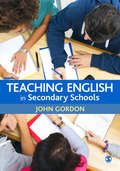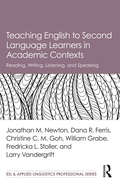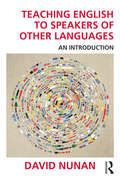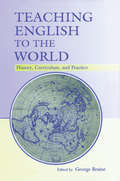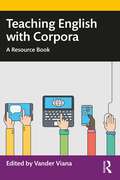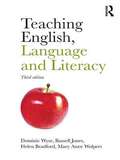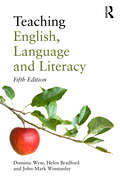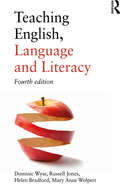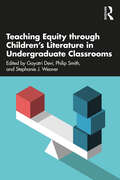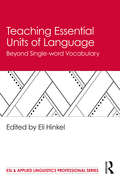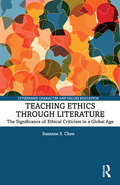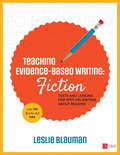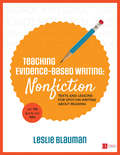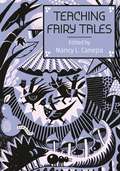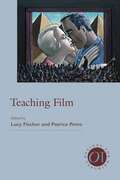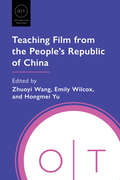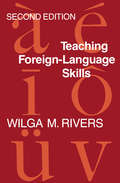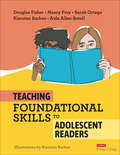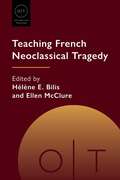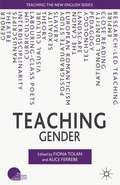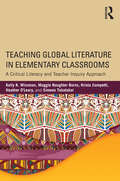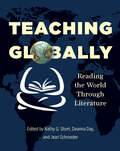- Table View
- List View
Teaching English in Secondary Schools
by John GordonThis book is an indispensable guide for anyone training to become a secondary English teacher. It provides an overview of the main topics taught in schools, informed by good teaching practice drawn from the classroom and supported by research and theory, and engages with the requirements of the 2014 National Curriculum for England. Each chapter is based around a ‘lesson feedback’ case study informed by real classroom observations combined with research findings to explore and analyse what underpins high quality English teaching. Coverage includes: · Encouraging a love of reading in your classroom · How to teach effective writing for pleasure and for information · Developing students’ grammar, vocabulary and spoken English · Inspiring teaching using drama, poetry and Shakespeare · Intelligent use of media and new literacies in teaching This is essential reading on all secondary English initial teacher education courses, including school-based (SCITT, School Direct, Teach First), university-based (PGCE) and employment-based routes into teaching.
Teaching English to Second Language Learners in Academic Contexts: Reading, Writing, Listening, and Speaking (ESL & Applied Linguistics Professional Series)
by William Grabe Dana R. Ferris Fredricka L. Stoller Larry Vandergrift Jonathan M. Newton Christine C.M. GohTeaching English to Second Language Learners in Academic Contexts: Reading, Writing, Listening, and Speaking provides the fundamental knowledge that ESL and EFL teachers need to teach the four language skills. This foundational text, written by internationally renowned experts in the field, explains why skills-based teaching is at the heart of effective instruction in English for academic purposes (EAP) contexts. Each of the four main sections of the book helps readers understand how each skill—reading, writing, listening, and speaking—works and explains what research has to say about successful skill performance. Pedagogically focused chapters apply this information to principles for EAP curriculum design and to instructional activities and tasks adaptable in a wide range of language-learning contexts. Options for assessment and the role of digital technologies are considered for each skill, and essential information on integrated-skill instruction is provided. Moving from theory to practice, this teacher-friendly text is an essential resource for courses in TESOL programs, for in-service teacher-training seminars, and for practicing EAP teachers who want to upgrade their teaching abilities and knowledge bases.
Teaching English to Speakers of Other Languages: An Introduction
by David NunanDavid Nunan's dynamic learner-centered teaching style has informed and inspired countless TESOL educators around the world. In this fresh, straightforward introduction to teaching English to speakers of other languages he presents teaching techniques and procedures along with the underlying theory and principles. Complex theories and research studies are explained in a clear and comprehensible, yet non-trivial, manner without trivializing them. Practical examples of how to develop teaching materials and tasks from sound principles provide rich illustrations of theoretical constructs. The content is presented through a lively variety of different textual genres including classroom vignettes showing language teaching in action, question and answer sessions, and opportunities to 'eavesdrop' on small group discussions among teachers and teachers in preparation. Readers get involved through engaging, interactive pedagogical features and opportunities for reflection and personal application. Each chapter follows the same format so that readers know what to expect as they work through the text. Key terms are defined in a Glossary at the end of the book. David Nunan's own reflections and commentaries throughout enrich the direct, up-close style of the text.
Teaching English to the World: History, Curriculum, and Practice
by George BraineTeaching English to the World: History, Curriculum, and Practice is a unique collection of English language teaching (ELT) histories, curricula, and personal narratives from non-native speaker (NNS) English teachers around the world. No other book brings such a range of international ELT professionals together to describe and narrate what they know best.The book includes chapters from Brazil, China, Germany, Hong Kong, Hungary, India, Indonesia, Israel, Japan, Lebanon, Poland, Saudi Arabia, Singapore, Sri Lanka, and Turkey. All chapters follow a consistent pattern, describing first the history of English language teaching in a particular country, then the current ELT curriculum, followed by the biography or the autobiography of an English teacher of that country. This consistency in the structuring of chapters will enable readers to assimilate the information easily while also comparing and contrasting the context of ELT in each country.The chapter authors--all born in or residents of the countries they represent and speakers of the local language or languages as well as English--provide insider perspectives on the challenges faced by local English language teachers. There is clear evidence that the majority of English teachers worldwide are nonnative speakers (NNS), and there is no doubt that many among them have been taught by indigenous teachers who themselves are nonnative speakers. This book brings the professional knowledge and experience of these teachers and the countries they represent to a mainstream Western audience including faculty, professionals, and graduate students in the field of ESL; to the international TESOL community; and to ELT teachers around the world.
Teaching English with Corpora: A Resource Book
by Vander VianaTeaching English with Corpora is an accessible and practical introduction to the ways in which online and offline corpora can be used in English language teaching (ELT). Featuring 70 chapters written by an international range of researchers and practitioners, this book: • provides readers with clear, tested examples of corpus-based/driven lesson plans; • contains activities relevant to English for general purposes and English for specific purposes; • caters for the needs of English language teachers working with learners at different proficiency levels; • features flexible teaching suggestions that can be explored as part of a lesson or as a full lesson. This book is an essential purchase for pre- and in-service English language teachers as well as those studying corpus linguistics in undergraduate/Master’s courses in applied linguistics, ELT and Teaching English to Speakers of Other Languages (TESOL).
Teaching English, Language and Literacy
by Dominic Wyse Russell Jones Helen Bradford Mary Anne Wolpert'This book is comprehensive, up-to-date, critical and authoritative. It is also, above all, well written. It will undoubtedly become standard reading for the next generation of teachers in training and practising teachers will also learn a great deal from dipping into its contents.' - David Wray, Professor of Literacy Education, University of Warwick '[A] well organised and comprehensive guide to the teaching of English and the teaching of language' Margaret Mallett - Emeritus Fellow of The English Association Are you looking for one book that covers every aspect of the teaching of English at primary level? Now fully updated, this third edition of Teaching English, Language and Literacy includes brand new chapters on children's literature and reading comprehension. Rooted in research evidence and multidisciplinary theory, this book is an essential introduction for anyone learning to teach English from the early years to primary school level. The authors draw on their research, scholarship and practice to offer advice on: developing reading, including choosing texts, and phonics teaching improving writing, including grammar and punctuation language and speaking and listening planning and assessing working effectively with multilingual pupils understanding historical developments in the subject the latest thinking in educational policy and practice the use of multimedia maintaining good home-school links gender and the teaching of English language and literacy All the chapters include clear examples of practice, coverage of key issues, analysis of research, and reflections on national policy to encourage the best possible response to the demands of national curricula. Each chapter also has a glossary to explain terms and gives suggestions for further reading. This book is for all who want to improve teaching English, language and literacy. Designed to help inform the practice of students on teacher training courses, but also of great use to those teachers wanting to keep pace with the latest developments in their specialist subject, this book covers the theory and practice of teaching English, language and literacy.
Teaching English, Language and Literacy
by Dominic Wyse Helen Bradford John-Mark WinstanleyAre you looking for one book that gives a comprehensive account of primary/elementary and early years English, language and literacy teaching? Based on robust research evidence and practical examples of effective teaching, this essential textbook critically evaluates curriculum policies and provides guidance for teachers on implementation of evidence-based teaching in classrooms. This fully revised fifth edition has a brand new chapter on Reading for Pleasure, and has substantially rewritten chapters to reflect recent developments in research, evaluations of new policy directions, and new practical examples of teaching and learning. The authors draw on their research, scholarship and practice to offer advice on: • inclusion and equality, including working effectively with multilingual pupils • the importance of talk and interaction • developing reading, including motivating children to read and phonics teaching • improving writing, including grammar and punctuation • planning and assessing • the latest educational policy and practice This authoritative book is an essential introduction for anyone who teaches English, language and literacy from the early years to primary school level, and seeks to improve their professional practice. Designed to help inform trainee teachers and tutors, but also of great use to those teachers wanting to keep pace with the latest developments in their specialist subject, this is an indispensable guide to the theory and practice of teaching English, language and literacy.
Teaching English, Language and Literacy (Routledge International Handbooks Of Education Ser.)
by Dominic Wyse Russell Jones Helen Bradford Mary Anne WolpertAre you looking for one book that gives a comprehensive account of primary and early years English, language and literacy teaching? This fully revised fourth edition of Teaching English, Language and Literacy includes up-to-date research and updated discussion of effective teaching. Throughout the book there is guidance on England’s new National Curriculum and its impact. Rooted in research evidence and multidisciplinary theory, this book is an essential introduction for anyone learning to teach English from the early years to primary school level. The authors draw on their research, scholarship and practice to offer advice on: inclusion and equality, including working effectively with multilingual pupils speaking and listening developing reading, including choosing texts, and phonics teaching improving writing, including grammar and punctuation planning and assessing the latest thinking in educational policy and practice the use of multimedia maintaining good home--school links All the chapters include examples of good practice, coverage of key issues, analysis of research and reflections on national policy to encourage the best possible response to the exciting challenges of teaching. Each chapter also has a glossary to explain terms and gives suggestions for further reading. This authoritative book is for all those who want to improve the teaching of English, language and literacy in schools. Designed to help inform trainee teachers and tutors, but also of great use to those teachers wanting to keep pace with the latest developments in their specialist subject, this is an indispensable guide to the theory and practice of teaching English, language and literacy.
Teaching Equity through Children’s Literature in Undergraduate Classrooms
by Philip Smith Gayatri Devi Stephanie J. WeaverChildren's literature has been taught in undergraduate classrooms since the mid-1960s and has grown to become a staple of English literature, library science, and education programs. Children's literature classes are typically among the most popular course offerings at any institution. It is easy to understand why; children's literature classes promise students the opportunity to revisit familiar works with fresh eyes. With the growth of the children’s publishing industry and the celebration of recent scholarly interventions in the field, the popularity of the discipline is unlikely to abate. A central question of current children’s literature scholarship and practice is how to effectively address contemporary questions of social justice. This collection offers a series of interventions for the practice of teaching equity through children's literature in undergraduate classrooms. It is intended for individuals who teach, or who are interested in teaching, children’s literature to undergraduates. It includes contributions from practitioners from a range of institutional affiliations, disciplinary backgrounds, nationalities, and career stages. Furthermore, this volume includes contributions from scholars who belong to groups which are often underrepresented within academia, due to race, nationality, ethnicity, gender identity, disability, or other protected characteristics.
Teaching Essential Units of Language: Beyond Single-word Vocabulary (ESL & Applied Linguistics Professional Series)
by Eli HinkelThis textbook provides a practical and research-based foundation for teaching second language (L2) multiword units (also commonly called collocations). Multiword units – such as strong tea, beautiful weather, or would you mind –cannot be readily understood or predicted by the meanings of their component parts, and prove particularly challenging for English language learners. With contributions from top scholars, this text presents a thorough and rounded overview of the principles and practices currently dominant in teaching L2 phrases in a variety of instructional settings around the world. Divided into two sections, Part I examines the pedagogical foundations of teaching the essential units of language. Part II covers a range of techniques and classroom activities for implementing instruction. Intended for students and teacher educators, this accessible volume integrates the key principles, strategies, and applications of current and effective English language instruction for both vocabulary and grammar.
Teaching Ethics through Literature: Igniting the Global Imagination (Citizenship, Character and Values Education)
by Suzanne S. ChooTeaching Ethics through Literature provides in-depth understanding of a new and exciting shift in the fields of English education, Literature, Language Arts, and Literacy through exploring their connections with ethics. The book pioneers an approach to integrating ethics in the teaching of literature. This has become increasingly relevant and necessary in our globally connected age. A key feature of the book is its integration of theory and practice. It begins with a historical survey of the emergence of the ethical turn in Literature education and grounds this on the ideas of influential Ethical Philosophers and Literature scholars. Most importantly, it provides insights into how teachers can engage students in ethical concerns and apply practices of Ethical Criticism using rich on-the-ground case studies of high school Literature teachers in Australia, Singapore and the United States.
Teaching Evidence-Based Writing: Texts and Lessons for Spot-On Writing About Reading (Corwin Literacy)
by Leslie A. BlaumanOne in a million. Yes, that’s how rare it is to have so many write-about-reading strategies so beautifully put to use. Each year Leslie Blauman guides her students to become highly skilled at supporting their thinking about texts, and in Evidence-Based Writing: Fiction, she shares her win-win process. Leslie combed the ELA standards and all her favorite books and built a lesson structure you can use in two ways: with an entire text or with just the excerpts she’s included in the book. Addressing Evidence, Character, Theme, Point of View, Visuals, Words and Structure, each section includes: Lessons you can use as teacher demonstrations or for guided practice, with Best the Test tips on how to authentically teach the skills that show up on exams with the texts you teach. Prompt Pages serve as handy references, giving students the key questions to ask themselves as they read any text and consider how an author’s meaning and structure combine. Excerpts-to-Write About Pages feature carefully selected passages from novels, short stories, and picture books you already know and love and questions that require students to discover a text’s literal and deeper meanings. Write-About-Reading Templates scaffold students to think about a text efficiently by focusing on its critical literary elements or text structure demands and help them rehearse for more extensive responses. Writing Tasks invite students to transform their notes into a more developed paragraph or essay with sufficiently challenging tasks geared for grades 6-8. And best of all, your students gain a confidence in responding to complex texts and ideas that will serve them well in school, on tests, and in any situation when they are asked: What are you basing that on? Show me how you know.
Teaching Evidence-Based Writing: Texts and Lessons for Spot-On Writing About Reading (Corwin Literacy)
by Leslie A. BlaumanOne in a million. Yes, that’s how rare it is to have so many write-about-reading strategies so beautifully put to use. Each year Leslie Blauman guides her students to become highly skilled at supporting their thinking about texts, and in Evidence-Based Writing: Fiction, she shares her win-win process. Leslie combed the ELA standards and all her favorite books and built a lesson structure you can use in two ways: with an entire text or with just the excerpts she’s included in the book. Addressing Evidence, Character, Theme, Point of View, Visuals, Words and Structure, each section includes: Lessons you can use as teacher demonstrations or for guided practice, with Best the Test tips on how to authentically teach the skills that show up on exams with the texts you teach. Prompt Pages serve as handy references, giving students the key questions to ask themselves as they read any text and consider how an author’s meaning and structure combine. Excerpts-to-Write About Pages feature carefully selected passages from novels, short stories, and picture books you already know and love and questions that require students to discover a text’s literal and deeper meanings. Write-About-Reading Templates scaffold students to think about a text efficiently by focusing on its critical literary elements or text structure demands and help them rehearse for more extensive responses. Writing Tasks invite students to transform their notes into a more developed paragraph or essay with sufficiently challenging tasks geared for grades 6-8. And best of all, your students gain a confidence in responding to complex texts and ideas that will serve them well in school, on tests, and in any situation when they are asked: What are you basing that on? Show me how you know.
Teaching Evidence-Based Writing: Texts and Lessons for Spot-On Writing About Reading (Corwin Literacy)
by Leslie A. BlaumanOne in a million. Yes, that’s how rare it is to have so many write-about-reading strategies so beautifully put to use. Each year Leslie Blauman guides her students to become highly skilled at supporting their thinking about texts, and in Evidence-Based Writing: Nonfiction, she shares her win-win process. Leslie combed the ELA standards and all her favorite books and built a lesson structure you can use in two ways: with an entire text or with just the excerpts she’s included in the book. Addressing Evidence, Relationships, Main Idea, Point of View, Visuals, Words and Structure, each section includes: Lessons you can use as teacher demonstrations or for guided practice, with Best the Test tips on how to authentically teach the skills that show up on exams with the texts you teach. Prompt Pages serve as handy references, giving students the key questions to ask themselves as they read any text and consider how an author’s meaning and structure combine. Excerpts-to-Write About Pages feature carefully selected passages from current biographies, informational books, and articles on the topics you teach and questions that require students to discover a text’s literal and deeper meanings. Write-About-Reading Templates scaffold students to think about a text efficiently by focusing on its critical craft elements or text structure demands and help them rehearse for more extensive responses. Writing Tasks invite students to transform their notes into a more developed paragraph or essay with sufficiently challenging tasks geared for grades 6-8. And best of all, your students gain a confidence in responding to complex texts and ideas that will serve them well in school, on tests, and in any situation when they are asked: What are you basing that on? Show me how you know.
Teaching Evidence-Based Writing: Texts and Lessons for Spot-On Writing About Reading (Corwin Literacy)
by Leslie A. BlaumanOne in a million. Yes, that’s how rare it is to have so many write-about-reading strategies so beautifully put to use. Each year Leslie Blauman guides her students to become highly skilled at supporting their thinking about texts, and in Evidence-Based Writing: Nonfiction, she shares her win-win process. Leslie combed the ELA standards and all her favorite books and built a lesson structure you can use in two ways: with an entire text or with just the excerpts she’s included in the book. Addressing Evidence, Relationships, Main Idea, Point of View, Visuals, Words and Structure, each section includes: Lessons you can use as teacher demonstrations or for guided practice, with Best the Test tips on how to authentically teach the skills that show up on exams with the texts you teach. Prompt Pages serve as handy references, giving students the key questions to ask themselves as they read any text and consider how an author’s meaning and structure combine. Excerpts-to-Write About Pages feature carefully selected passages from current biographies, informational books, and articles on the topics you teach and questions that require students to discover a text’s literal and deeper meanings. Write-About-Reading Templates scaffold students to think about a text efficiently by focusing on its critical craft elements or text structure demands and help them rehearse for more extensive responses. Writing Tasks invite students to transform their notes into a more developed paragraph or essay with sufficiently challenging tasks geared for grades 6-8. And best of all, your students gain a confidence in responding to complex texts and ideas that will serve them well in school, on tests, and in any situation when they are asked: What are you basing that on? Show me how you know.
Teaching Fairy Tales (Series in Fairy-Tale Studies)
by Gioia Timpanelli Cristina Mazzoni Allison Stedman Ann Schmiesing Jennifer Schacker Prof. Nancy L. Canepa Prof. Jack Zipes Dean Donald Haase Lewis C. Seifert Prof. Anne E. Duggan Professor Maria Nikolajeva Prof. Cristina Bacchilega Associate Professor Christine A. Jones Julie L. Koehler Kay Stone Prof. Maria Tatar Prof. Victoria Somoff Prof. Gina Miele Prof. Linda Kraus Worley Prof. Faith E. Beasley Prof. Charlotte Trinquet du Lys Prof. Benjamin Balak Prof. Suzanne Magnanini Dr Maria Kaliambou Prof. Elio Brancaforte Prof. William Moebius Prof. Graham AndersonTeaching Fairy Tales edited by Nancy L. Canepa brings together scholars who have contributed to the field of fairy-tale studies since its origins. This collection offers information on materials, critical approaches and ideas, and pedagogical resources for the teaching of fairy tales in one comprehensive source that will further help bring fairy-tale studies into the academic mainstream. The volume begins by posing some of the big questions that stand at the forefront of fairy-tale studies: How should we define the fairy tale? What is the "classic" fairy tale? Does it make sense to talk about a fairy-tale canon? The first chapter includes close readings of tales and their variants, in order to show how fairy tales aren’t simple, moralizing, and/or static narratives. The second chapter focuses on essential moments and documents in fairy-tale history, investigating how we gain unique perspectives on cultural history through reading fairy tales. Contributors to chapter 3 argue that encouraging students to approach fairy tales critically, either through well-established lenses or newer ways of thinking, enables them to engage actively with material that can otherwise seem over-familiar. Chapter 4 makes a case for using fairy tales to help students learn a foreign language. Teaching Fairy Tales also includes authors’ experiences of successful hands-on classroom activities with fairy tales, syllabi samples from a range of courses, and testimonies from storytellers that inspire students to reflect on the construction and transmission of narrative by becoming tale-tellers themselves. Teaching Fairy Tales crosses disciplinary, historical, and national boundaries to consider the fairy-tale corpus integrally and from a variety of perspectives. Scholars from many different academic areas will use this volume to explore and implement new aspects of the field of fairy-tale studies in their teaching and research.
Teaching Film (Options for Teaching #35)
by Patricia White Mark Lynn Anderson Adam Lowenstein Hamid Naficy Dudley Andrew Timothy Corrigan Anne Rutherford Tasha Oren Garrett Stewart E. Ann Kaplan Gwendolyn Audrey Foster Michael Renov Pat Brereton David Desser Maureen Turim Paula J. Massood Michael Aronson Nataša Ďurovičová Mark LangerFilm studies has been a part of higher education curricula in the United States almost since the development of the medium. Although the study of film is dispersed across a range of academic departments, programs, and scholarly organizations, film studies has come to be recognized as a field in its own right. In an era when teaching and scholarship are increasingly interdisciplinary, film studies continues to expand and thrive, attracting new scholars and fresh ideas, direction, and research.Given the dynamism of the field, experienced and beginning instructors alike need resources for bringing the study of film into the classroom. This volume will help instructors conceptualize contemporary film studies in pedagogical terms. The first part of the volume features essays on theory and on representation, including gender, race, and sexuality. Contributors then examine the geographies of cinema and offer practical suggestions for structuring courses on national, regional, and transnational film. Several essays focus on interdisciplinary approaches, while others describe courses designed around genre (film noir, the musical), mode (animation, documentary, avant-garde film), or the formal elements of film, such as sound, music, and mise-en-scène. The volume closes with a section on film and media in the digital age, in which contributors discuss the opportunities and challenges presented by access to resources, media convergence, and technological developments in the field.
Teaching Film from the People's Republic of China (Options for Teaching)
by Zhuoyi Wang, Emily Wilcox, and Hongmei YuThis volume brings a diverse range of voices--from anthropology, communication studies, ethnomusicology, film, history, literature, linguistics, sociology, theater, and urban geography--into the conversation about film from the People's Republic of China. Essays seek to answer what films can reveal or obscure about Chinese history and society and demonstrate how studying films from the PRC can introduce students to larger issues of historical consciousness and media representation.The volume addresses not only postsocialist fictional films but also a wide variety of other subjects including socialist period films, documentaries, films by or about people from ethnic minority groups, film music, the perspectives of female characters, martial arts cinema, and remakes of South Korean films. By exploring how films represent power, traditions, and ideologies, students learn about both the complexity of the PRC and the importance of cross-cultural and cross-ideological understanding.
Teaching Foreign Language Skills
by Wilga M. RiversSince its original publication in 1968, Rivers's comprehensive and practical text has become a standard reference for both student teachers and veteran instructors. All who wish to draw from the most recent thinking in the field will welcome this new edition. Methodology is appraised, followed up by discussions on such matters as keeping students of differing abilities active, evaluating textbooks, using language labs creatively, and preparing effective exercises and drills. The author ends each chapter of this new edition with questions for research and discussion—a useful classroom tool—and provides an up-to-date bibliography that facilitates further understanding of such matters as the bilingual classroom.
Teaching Foundational Skills to Adolescent Readers
by Douglas Fisher Nancy Frey Sarah Ortega Kierstan Barbee Aida Allen-RotellRecharge Adolescent Literacy: Strategies to Foster Joyful and Proficient Readers There are many adolescent readers who, for a variety of reasons, find it difficult to connect with written words and have fallen behind on their foundational reading skills. Thankfully, it’s never too late to give these necessary skills a boost and help students find joy in reading and learning. Armed with equity, empathy, evidence-based research, and practical application, Teaching Foundational Skills to Adolescent Readers provides classroom practices teachers can use with the whole class or with small groups to integrate reading support seamlessly with grade-level content learning. Bestselling authors Douglas Fisher and Nancy Frey, along with Sarah Ortega, Kierstan Barbee, and Aida Allen-Rotell, creatively organize the book around a metaphor: adolescent literacy is a battery—when all the parts are connected, working together, and fully charged—literacy can thrive. Throughout the book, the following features will guide your learning: Plug Into the Research – an overview of the evidence-based research supporting each section of the literacy model Power Up Classroom Practice – connecting the dots on the research, classroom practice and human aspects of learning Voices from the Field – classroom examples of application and strategies from other secondary educators Take Charge – key takeaways and reflection questions Tips on building and organizing your classroom library to incorporate tools, technology, and media available to maximize lesson effectiveness Dozens of videos to model time-efficient strategies and key concepts By focusing on research, classroom practices, and the human aspects of learning, this book is an essential tool to recharge reading practices for adolescent readers and help educators increase foundational reading skills in the classroom.
Teaching Foundational Skills to Adolescent Readers
by Douglas Fisher Nancy Frey Sarah Ortega Kierstan Barbee Aida Allen-RotellRecharge Adolescent Literacy: Strategies to Foster Joyful and Proficient Readers There are many adolescent readers who, for a variety of reasons, find it difficult to connect with written words and have fallen behind on their foundational reading skills. Thankfully, it’s never too late to give these necessary skills a boost and help students find joy in reading and learning. Armed with equity, empathy, evidence-based research, and practical application, Teaching Foundational Skills to Adolescent Readers provides classroom practices teachers can use with the whole class or with small groups to integrate reading support seamlessly with grade-level content learning. Bestselling authors Douglas Fisher and Nancy Frey, along with Sarah Ortega, Kierstan Barbee, and Aida Allen-Rotell, creatively organize the book around a metaphor: adolescent literacy is a battery—when all the parts are connected, working together, and fully charged—literacy can thrive. Throughout the book, the following features will guide your learning: Plug Into the Research – an overview of the evidence-based research supporting each section of the literacy model Power Up Classroom Practice – connecting the dots on the research, classroom practice and human aspects of learning Voices from the Field – classroom examples of application and strategies from other secondary educators Take Charge – key takeaways and reflection questions Tips on building and organizing your classroom library to incorporate tools, technology, and media available to maximize lesson effectiveness Dozens of videos to model time-efficient strategies and key concepts By focusing on research, classroom practices, and the human aspects of learning, this book is an essential tool to recharge reading practices for adolescent readers and help educators increase foundational reading skills in the classroom.
Teaching French Neoclassical Tragedy (Options for Teaching #55)
by Hélène E. Bilis and Ellen McClureTragedy has been reborn many times since antiquity. Seventeenth-century French playwrights composed tragedies marked by neoclassical aesthetics and the divine-right absolutism of the Grand Siècle. But their works also speak to the modern imagination, inspiring reactions from Barthes, Derrida, and Foucault; adaptations and reworkings by Césaire and Kushner; and new productions by francophone and anglophone directors.This volume addresses both the history of French neoclassical tragedy--its audiences, performance practice, and development as a genre--and the ideas these works raise, such as necessity, free will, desire, power, and moral behavior in the face of limited choices. Essays demonstrate ways to teach the plays through a variety of lenses, such as performance, spectatorship, aesthetics, rhetoric, and affect. The book also explores postcolonial engagement, by writers and directors both in and outside France, with these works.
Teaching Gender
by Alice Ferrebe Fiona TolanEncompassing feminism, masculinities and queer theory, and drawing on film, literature, language, creative writing and digital technologies, these essays, from scholars experienced in teaching gender theory in university English programmes, offer inventive and student-focused strategies for teaching gender in the twenty-first century classroom.
Teaching Global Literature in Elementary Classrooms: A Critical Literacy and Teacher Inquiry Approach
by Kelly K. Wissman Maggie Naughter Burns Krista Jiampetti Heather O'Leary Simeen TabatabaiDemonstrating the power of teaching global literature from a critical literacy perspective, this book explores the ways that K-6 educators can infuse diverse texts into their classrooms and find support for their endeavours in teacher inquiry communities. Through carefully analyzed, ethnographically informed portraits of classroom life alternating with teachers’ own accounts of their teaching and learning experiences, it demonstrates how students are moved to question, debate, and take action in response to global texts. This multi-vocal work both emerges from and responds to tensions and debates related to the purpose and practice of literature education in a time of Common Core State Standards.
Teaching Globally: Reading the World through Literature
by Kathy Short Deanna Day Jean SchroederWith the world visibly present in students' lives through technology, mass and social medias, economic interdependency, and global mobility, it is more important than ever to develop curriculum that is intercultural. In Teaching Globally: Reading the World Through Literature, a community of educators show us how to use global children's literature to help students explore their own cultural identities. Edited by Kathy Short, Deanna Day, and Jean Schroder, this book explains why global curriculum is important and how you can make space for it within district and state school mandates. Teaching Globally is built around a curriculum framework developed by Short and can help teachers integrate a global focus into existing literacy and social studies curricula, evaluate global resources, guide students as they investigate cross-cultural issues, and create classroom activities with an intercultural perspective. Filled with vignettes from K-8 urban, suburban, and rural schools that describe successes and struggles, Teaching Globally aims to integrate global literature into classrooms and challenge students to understand and accept those different from themselves. The book also includes extensive lists of recommendations, websites, professional books, and an appendix of global text sets as mentioned by the authors. '
